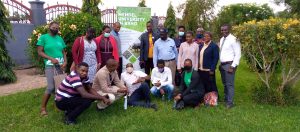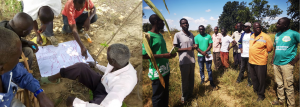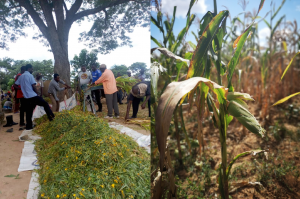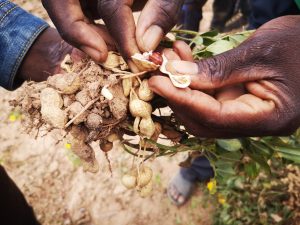Extracted and translated from the Original:
MENDELU is working in the Southern province of Zambia since 2014 in natural resource management and agriculture. Markéta Smrčková, project manager from Faculty of Forestry and Wood Technology at Mendel University in Brno, gave an interview to the Czech Development Agency about the project Silvopastoral systems as a strategy for sustainable agriculture to increase the living standards of small-scale farmers in the Southern Province of Zambia.
There are several problems that small farmers in Zambia face. Can you describe some of them with the example of specific farmers you met as part of the project?
Due to the long-term operation of MENDELU in Zambia, there is a number of these examples, as we work with individual farmers and communities intensively. For example, in the Southern Province, there is a large number of livestock, and farmers are vitally dependent on milk and meat production. However, the hygienic conditions of their milking or processes of feed production are not sufficient, thus it reduces the quantity and quality of production. For example, farmer Bernadette Mutoloki from Choma has adjusted the nutritional composition of the feed based on our training, introduced silage fodder production, and now has a regular milk intake from which she can pay school fees for her four children. In the Kemba community in the district of Monze, farmers collaborate on community-planned grazing, which leads not only to higher production but also to the rehabilitation of degraded and desertifying land.
Mendel University in Brno has been helping small farmers in Zambia since 2014. Have you noticed the continuing negative effects of climate change on their way of life and livelihood since then?
If we are talking about the Southern Province of Zambia, the changes in those seven years are huge. Rapid deforestation is taking place in this area, the landscape is inappropriately managed (e.g. excessive grazing) and thus, among other things, the microclimate is changing dramatically. Also, rainwater infiltration is reduced, erosion is increased, species diversity is greatly decreased and its production potential is also declining. In connection with uneven and unpredictable rains, farmers then face a long and constantly prolonged periods of drought. Farmers try to adapt to the changing conditions by diversifying their production, by involving more nutritionally valuable crops, but they often do not have the knowledge or resources to do so. And at this moment, our support takes place.
How difficult was it to convince local farmers that their traditional farming practices were not sustainable and that it would be better for them to take over your practices?
It is not a question of taking over „our“ procedures, but of finding a certain connection between traditional and modern techniques, based on the cooperation of Czech and Zambian experts or Zambian authorities. In some areas, however, even such basics as hay production or silage are largely unknown. It is not enough to train farmers and think that this will change everything, practical demonstrations and long-term support are absolutely crucial. Training is just the beginning. Regular and long-term cooperation, consultations, and advice are then absolutely crucial, but also time-consuming. We try to approach training and work with communities so that farmers take responsibility for their farm development.
Is it difficult to motivate farmers to actively cooperate in agricultural cooperatives? Do they tend to have an individual or maximally family way of farming within their farming?
It depends on what area you are in, what production we are talking about, etc. For example, milk producers usually cooperate smoothly in cooperatives, as there are regular sales and thus income. In general, if cooperatives are managed transparently and farmers trust the management they have chosen, then cooperation can be very effective. However, when leadership is not transparent, mistrust deepens and that can lead to greater individualism.
What is the basis of the project Silvopastoral systems as a strategy for sustainable agriculture to raise the living standards of small farmers in the Southern Province of Zambia?
The project is based on several interconnected pillars – supporting the increase of plant and animal production, protection and regeneration of natural resources (mainly forest and water resources), and, last but not least, increasing the capacity of farmers and cooperatives in financial areas, farm planning and connection to local markets and customers of any surpluses. Simply put, without proper management of natural resources, a farmer may have better production in his field (by increasing productivity), but the landscape and environment around him will continue to deteriorate (e.g. lack of water), which will significantly affect him in the years to come, when, despite new knowledge, the land will not be able to produce that much. And if the farmer already has some surpluses, he needs to be able to process and store or sell them. And as the name of the project suggests – silvopastoral – it is a combination of growing trees with pastures for livestock. These agroforestry systems serve primarily to increase the stability of animal production and also bring significant cultural, social, and environmental benefits.
Based on your many years of experience in the Southern Province of Zambia, you are able to work openly and participatorily with farmers, communities, and Zambian partners, thus ensuring a sense of ownership of the project by locals. How complex is this procedure and it is abasis for the sustainability of project results and procedures?
Our goal is not to implement a project that is not based on the real needs of locals or is not accepted by local partners. Already when writing the project, we did the consultations with local authorities and communities, with whom we discuss their needs and approaches and come up with ideas on how to deal with some issues and what is in the capabilities of a potential future project and MENDELU. We then apply the same approach in the case of training. In most cases, the training are done by our Zambian employees, or cooperating government officials, all in the communities, all applying the principles discussed in advance with Czech experts and the Zambian provincial administration. For example, one of the approaches we apply to increase field productivity and pasture regeneration, the so-called holistic management of land and livestock, is directly based on the fact that as an organization we act only as a facilitator of the process. All decisions in a given community are made by the community itself after discussion with traditional leaders and government representatives. MENDELU then rather oversees the correct and timely implementation. It is a more time-consuming process, but it brings results in the form of accepting the responsibility of local communities and authorities over the activities.
The project is being carried out in close cooperation not only with local farmers but also with the German development agency GIZ (Deutsche Gesellschaft für Internationale Zusammenarbeit). How did this cooperation arise and what is it based on?
GIZ has been working in the Southern Province for many years, so regular communication is essential to avoid duplication of activities in overlapping areas. GIZ has a wider scope of its activities (also due to much larger financial volume), while MENDELU has greater direct impacts on farmers and communities. This created space for these approaches to be interconnected, and I am glad that this is gradually happening. Currently, the project will be supported by GIZ experts to create and implement a business plan for agricultural machinery in two cooperatives so that they are financially sustainable and profitable. MENDELU, on the other hand, will provide the German agency with technical knowledge and approaches to working with farmers, which have been proven by many years of fieldwork.
In total, the project will directly support 200 farmers and women farmers from local communities, and indirectly positively affect up to 2,500 inhabitants. What do local farmers value most about its benefits?
The project works regularly with 200 farmers and women farmers who gain technical knowledge, agricultural inputs, and above all regular consultations and advice directly on their farms. On these farms training for practical demonstrations then take place, in which a much larger number of people participate. We want to make technical knowledge available not only to selected „project“ farmers but to anyone in the community who is interested in gaining new knowledge, for example in the area of livestock feed production. Most farmers appreciate the practicality of the training, which takes place directly „next door“ and always uses available local materials. Farmers will directly try out the given procedures, e.g. during training on the creation of silage, farmers participate in the collection of material, excavation of pits, the preparation of silage, and its completion. They did not only leave the training with information on why and how, but they tried it out for themselves. They could come home and do the same the next day on their farms.
Too often, universities are not direct implementers of development projects. What leads MENDELU to these activities? What else do you do as a university in Zambia?
Yes, univesities are typically understood more as a technical expert support to non-profit organizations or companies. However, within MENDELU, social responsibility, the so-called third role of the university, is a widely discussed topic and MENDELU takes it seriously. In Zambia, except for two development projects, we are also working on research about seasonal tropical forests in the context of wood consumption as an energy source. We also work with the University of Copperbelt and its Faculty of Natural Resources. This cooperation helps to increase the quality of higher education, either by directly supporting students’ fieldwork or by helping to improve doctoral studies. The plan includes collective research activities and student exchanges to gain practical experience.



